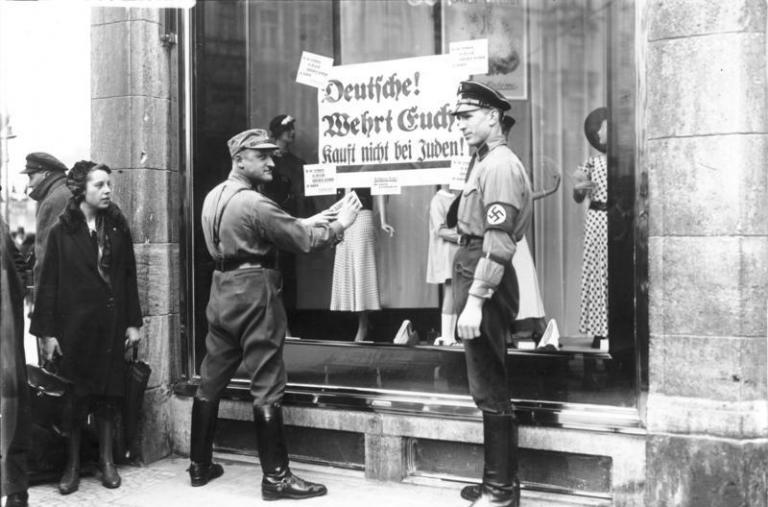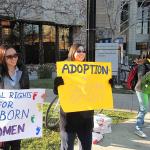Today, November 9, is the anniversary of Kristallnacht, and the beginning of the Holocaust.
According to the Writer’s Almanac:
Hitler and Joseph Goebbels used the assassination of a German diplomat by a Polish Jew as an excuse to organize a “spontaneous” riot. Goebbels told an assembly of National Socialists that “the Führer has decided that […] demonstrations should not be prepared or organized by the Party, but insofar as they erupt spontaneously, they are not to be hampered.” Throughout Germany and parts of Austria and Czechoslovakia, Nazi Stormtroopers and Hitler Youth put thousands of synagogues, homes, businesses, and schools to the torch — and blamed the Jewish victims for the damage they caused. They smashed windows, looted shops, dragged Jews from their homes, and desecrated graves. The government gave instructions to firefighters not to intervene, and told local police to round up as many young Jewish men as their jails could hold. It was the first mass incarceration of Jews by the Nazi government, and so many people consider Kristallnacht to be the beginning of the Holocaust.
It is important for us to understand that an incident like this did not happen out of the blue. It was prepared for. It is rare that anyone, whether private organizations or political powers, is able to perpetrate mass infamy in such a widespread manner, and not meet with strong resistance. The Nazis were able to orchestrate these supposedly independent attacks and desecrations because they knew they would meet with little resistance. They knew they would meet with little resistance because they had spent years carefully grooming the nation to accept evil as good, to defend injustice as justice, or at least to turn a blind eye to that which did not affect them directly.
Remember, too, that many “good” Germans supported the Nazi party not because they were consumed with hatred for Jews, the disabled, the Roma, and LGBTQ persons. They simply felt that the hardships to which the regime subjected these persons, though regrettable, were nevertheless acceptable sacrifices in exchange for economic security, and the promise that Germany would be made “great” again. They did not relish the suffering of the Nazis’ victims. Instead, they decided not to see, not to talk about it, and to accept excuses that it wasn’t happening.
As I consider this event in our not so distant past, I think–as I often do–about how different history would look, if more of those “good” Germans has stood up and spoken out earlier. What if religious leaders had done more to quell the rise of fascism while it was still in its infancy? What if the different pockets of resistance, in the 1930s, had managed to band together, look past their differences, and form a cohesive union?
At this moment in the United States we are collectively breathing a sigh of relief because we have succeeded in unseating fascism by means of democratic processes. Our electoral system, flawed as it is, functioned as it was intended to function. And enough of us were awake to the reality of history past and present to use it towards a just end.
This, however, is just the beginning. Fascism unseated is still fascism among us, and if it becomes less visible for a while we should not relax our vigilance, because this simply means it has gone underground. We should be wary about surface applications of “unity” as a bandage for our wounds, because our problem is not simply that we have been divided. If our divide had been over some matter on which people could reasonably be expected to “agree to disagree,” such a unity would be worth pursuing through dialogue and compromise.
But there can be no compromise with fascism. There can be no compromise with an ideology that places the demands of the few above the rights of the many, that is willing to sacrifice the Other for the sake of economic security, that justifies crimes against humanity by arguing that non-citizens are undeserving of protection. We do need to work to heal the divides in our nation, but these divides can not be healed if we do not first heal the deep wounds caused by white supremacy, racism, anti-Semitism, and bigotry. Nor can they be healed if the disease of fascism is not cured. At the same time, the evils and inequalities that are endemic in our nation should not be ignored, simply because a greater evil has been suppressed. The problems of poverty, income inequality, systemic racism, and corporate excess are still with us. We can not simply accept the new democratic administration as heroes; we must press them to address the dire needs of our nation.
Unseating Trump by means of democratic processes was an important victory–but, it was only the beginning. We have a lot of work ahead of us, in the years ahead. The forces behind MAGA–the same spiritual forces that were behind Kristallnacht–are still among us.
image credit: Bundesarchiv_Bild_102-14468_Berlin_NS-Boykott_gegen_jüdische_Geschäfte.jpg
















